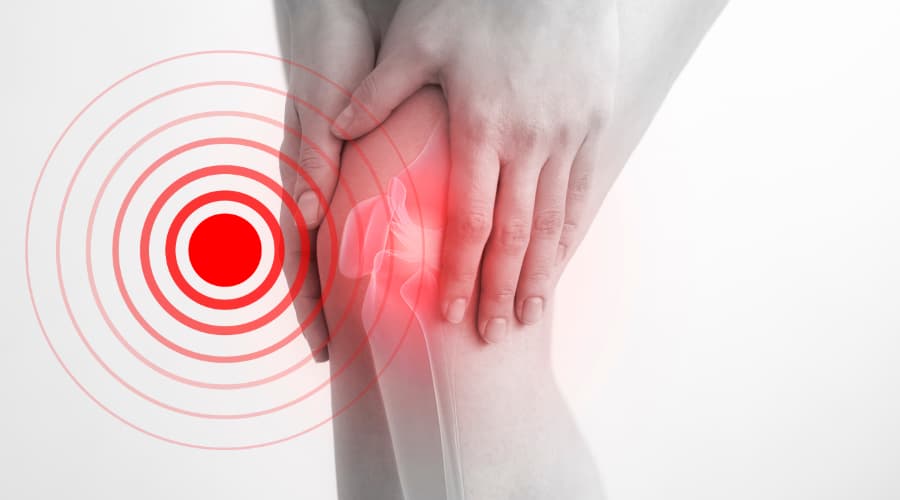If you suffer from osteoarthritis, you know how difficult some days can be to overcome pain and perform routine activities. Osteoarthritis can affect any joint. Arthritis in the knees is particularly debilitating. The knees support the weight of the entire body. Many postures and movements, including bending, standing, turning and sitting, involve the knees. In the UK, approximately 20% of the population over the age of 45 suffers from osteoarthritis of the knees.
The progression of this degenerative joint disease may cause more pain or loss of movement that does not respond to standard treatments. Standard treatments include pain medication, exercise, hot and cold packs, physical therapy and lifestyle modifications. Doctors often recommend surgery when traditional treatments no longer allow ease of movement or alleviate pain.
Other treatments, including chiropractic intervention, acupuncture and other alternative medicine therapies, help improve movement and reduce pain. One promising treatment for osteoarthritis of the knees is hyaluronic acid injections. Although this therapy does not work for all patients, research shows that hyaluronic acid injections reduce pain and stiffness for many who have arthritis in the knees. Tunbridge Wells Chiropractic and Shockwave Clinic offer several treatment options for osteoarthritis, including hyaluronic acid injections.
What Is Osteoarthritis?
Osteoarthritis is a musculoskeletal disorder that can affect any joint in the body but commonly affects the hips, knees, spine, feet and hands. Joints are protected by cartilage and synovial fluid that buffer the point where bones meet. It cannot protect bones if cartilage becomes brittle, weakened or erodes. As the cartilage deteriorates, the spacing between bones reduces. The lack of cushioning can affect bones, ligaments and other soft tissues around the joints, causing pain, swelling and stiffness.
Studies suggest inflammation is associated with the development of osteoarthritis. Although osteoarthritis is often associated with ageing, it can also develop when joints are damaged from repetitive movements or injury. In addition, low-grade inflammation is common in obese people. Being overweight can also affect the knees, which must bear the additional weight.
What Is Hyaluronic Acid?
Synovial joints produce and encapsulate synovial fluid, a natural bodily substance. Composed of hyaluronic acid and albumin, synovial fluid cushions and lubricates joints. This fluid is slick and viscous, enhancing movement and protecting cartilage and bones. Many joints, including the knees, are covered with synovial membranes.
When joints are in motion, the synovial fluid stored in cartilage is squeezed out to lubricate and cushion the bones and soft tissues. When joints are stationary, cartilage absorbs synovial fluid. As the cartilage deteriorates, the body compensates by producing more synovial fluid to cushion the joint. This often causes more pain. Over time, bones may deteriorate, grow bony spurs or change shape.
Hyaluronic acid, also called hyaluronan, is a glycosaminoglycan produced in cell membranes. It occurs throughout the body in neural, epithelial and connective tissues. It is a significant component of synovial fluid and coats each cell in cartilage, which helps keep cartilage and joints lubricated. It aids in wound healing and tissue regeneration. It absorbs and stores fluid, transports nutrients throughout the body, lubricates joints and cartilage and helps filter substances that cause inflammation. It also acts as a shock absorber, an essential function for weight-bearing joints such as the knees.
Commercially manufactured hyaluronic acid is used as a medication to enhance joint health. As we age, our bodies produce less hyaluronic acid. The reduction of hyaluronic acid and cartilage loss contributes to worsening knee osteoarthritis.
How Do Hyaluronic Acid Injections Work?
Hyaluronic acid injections are approved by the U.S. Food and Drug Administration to treat knee osteoarthritis. The substance is injected directly into the joint and must be administered by a medical professional. The molecular structure of hyaluronan allows it to form a meshwork that improves cushioning and elasticity around the joint. The meshwork also filters out large molecules that cause inflammation. It creates a protective barrier in synovial tissues, which helps reduce inflammation and pain. The high viscosity of the fluid allows ease of movement between cartilage and bones.
Reduction of pain and inflammation after hyaluronic acid injections takes time, generally about four weeks after the first treatment. Some patients feel relief from pain and inflammation up to six months after the first injection. Your doctor may advise having multiple injections to optimise comfort. You may experience relief for as long as three years with various injections.
Although hyaluronic acid injections do not work for everyone, they provide relief for many people. The treatment does not cure knee osteoarthritis. However, research suggests that the lubricating effects and pain reduction may stimulate cells that produce cartilage, slowing down the progression of the disease.
Who Can Benefit From Hyaluronic Acid Injections?
People suffering from chronic knee arthritis can benefit from these injections. Studies show that hyaluronic acid injections may delay the need for knee surgery or knee replacement by several years. Reducing pain and inflammation and increasing joint lubrication give patients relief from the unpleasant effects of knee arthritis and improve their quality of life. Many standard medications used to relieve pain, such as anti-inflammatories and steroids, cannot be used for extended periods because they may cause additional health problems in older adults.
Hyaluronic acid injections have few side effects, making them safe for most people. After an injection, you may feel soreness or swelling at the injection site. Pregnant or lactating women should not take the injections. There is insufficient information available to evaluate how the substance affects the foetus, whether it passes through breast milk or affects nursing infants.
Hyaluronic Acid Injections at Tunbridge Wells Chiropractic and Shockwave Clinic
The medical practitioners at Vale Health Clinic is authorised to administer hyaluronic acid injections. We use Ostenil Plus, a solution of sodium hyaluronate. It does not contain animal proteins, which reduces the potential for an allergic reaction. It is a pure, precisely formulated solution created by fermentation. We inject it into the joint using imaging equipment to ensure precise placement.
After approximately two weeks, you should notice a reduction in pain. Our clinicians will consult you to determine how many injections to give and how often. After a few months, the effects may wear off. We will review your situation to see if additional injections will be helpful.
If you are suffering from osteoarthritis of the knee, please feel free to contact us to schedule an evaluation. We will devise a treatment plan based on your needs, lifestyle and condition.
Related Articles
- How Effective are Hyaluronic Acid Injections?
- Hyaluronic Acid Injections: Potential Side Effects
- Ostenil Plus: Hyaluronic Acid Injections
- Hyaluronic Acid Injections FAQs
- Osteoarthritis Management and Self Care




